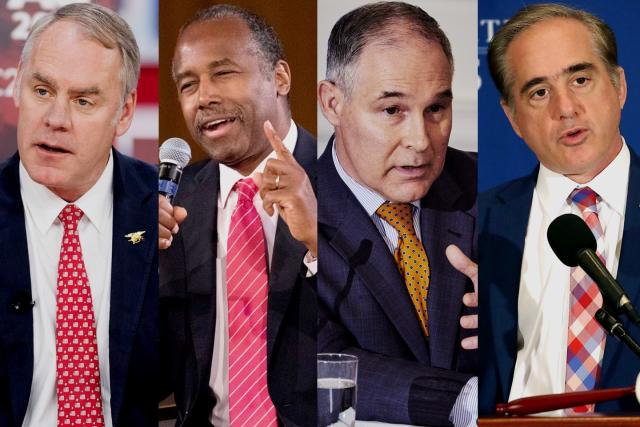
When your boss is Donald Trump, it’s probably difficult to differentiate right from wrong, or what constitutes “bad press.” Nevertheless, the White House, apparently embarrassed by near-daily revelations of ethics violations by its Cabinet secretaries, apparently decided last month that it was time for a little remedial lesson in how to avoid headlines like “V.A. Chief Shulkin Made Up an Award to Take His Wife on a Taxpayer-Funded European Vacation,” and “Ben Carson Thinks His $31,000 Office Redesign Was Totally Reasonable.” CNN reports that the White House held a series of private meetings in February with four Cabinet-level officials to “scold them for embarrassing stories about questionable ethical behavior at their respective agencies,” and to give them a crash course in Ethical Behavior 101.
Among the officials getting an earful from the principal were Ryan Zinke, whose department blamed Barack Obama for its inability to explain the interior secretary’s private-jet habit; HUD Secretary Ben Carson, whose office recently came into possession of (and then allegedly returned!) a $31,000 dining-room set; E.P.A. Administrator Scott Pruitt, who told the press that his security detail forced him to fly first or business class because someone was mean to him in an airport once; and Veterans Affairs Secretary David Shulkin, whose wife got to see Wimbledon on the taxpayer’s dime, and who may or may not have made the secret service pick up his dry cleaning.
The meetings, held at the request of Chief of Staff John Kelly, were reportedly meant to provide ”a clear message that optics matter;” officials were given a document called ”creating a culture of compliance,“ which laid out advice like:
- “You are the best guardian of your reputation. Your recordkeeping practices must be designed with a purpose to prove innocence at the complaint phase or with the press”;
- “Optics questions: Does the event or travel further the President’s priorities, your department or agency’s mission; or, does it appear
recreational or entertainment in nature”; - “Remember, an ethics opinion matters only if the ethics officer received all of the information”;
- And our personal favorite: “Even if legal, does not mean you should do it—always consider optics.”
During the sessions, which shockingly did not involve visual aids and a quiz at the end (“You have a meeting in Pittsburgh and you have the option to buy a $1,500 first-class ticket, or a $297 ticket in coach. Which do you choose?”), officials were told to tip the White House off to any potential bad press on the horizon. Unfortunately, not everyone paid attention in class:
Shortly after the session with Zinke, CNN published a report with several examples that ethics watchdogs say raise questions about whether Zinke is misusing his travel privileges, despite receiving approval from the department’s lawyer and ethics officer.
The White House was disappointed after meeting with Zinke because his agency failed to mention the story, of which Interior was aware and quoted a department spokesperson on the record, the source familiar told CNN.
Asked about the White House’s unhappiness, an Interior spokesperson who declined to be named, [said,] “This is such a nothingburger.”
Nothingburgers aside, there’s no question that the “anything goes” mentality of the Trump White House starts at the top. Yet even the president has begun to second-guess the Cabinet that he once declared to have “by far the highest I.Q. of any Cabinet ever assembled”; per Axios’s Jonathan Swan, in recent weeks Trump has been “privately question[ing] the basic intelligence of . . . Cabinet officials.”





